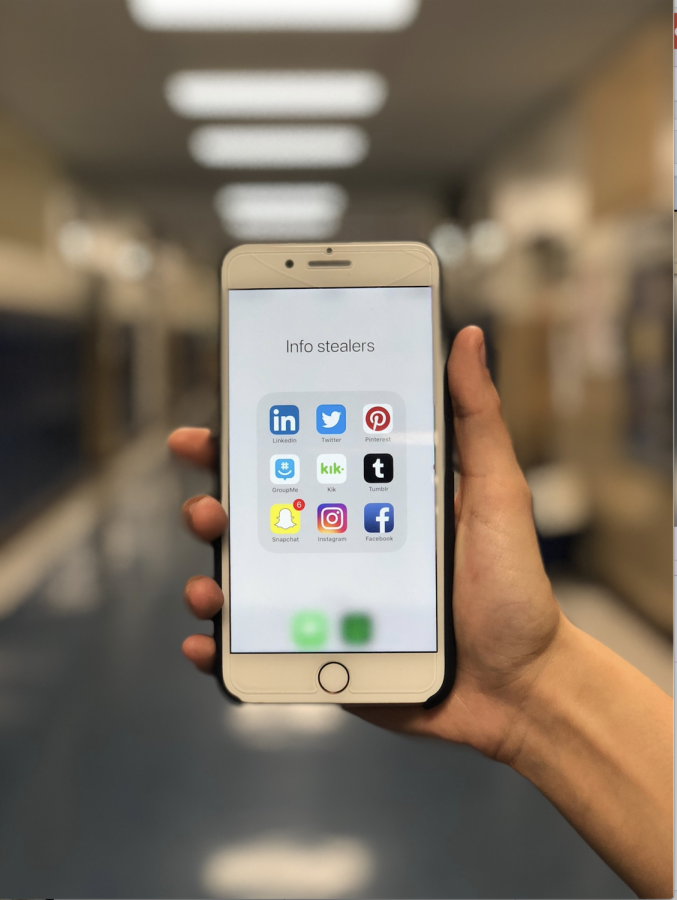Reality check: Our not-so-private lives
What the internet knows about you in 2018, and what you should know about it.
May 23, 2018
It may be surreal to think about, but the internet could know you better than you know yourself.
Where were you last week at four o’clock? Google knows that. What interested you 10 years ago? Facebook has all that information. What Hannah Montana songs were you listening to back in 2009? A quick look at YouTube and you’ll have your answer. No matter who you are, where you live or what you do for a living, the internet knows it all.
According to the Pew Research Center, 74 percent of Americans claim that it is very important to them to control who can get information about them, yet 48 percent of web users stated that they have difficulty managing their privacy controls on social media. Why is that?
Only nine percent of social media users said they were “very confident” that social media companies would protect their data. Yet that doesn’t stop people from using social media, since every day more than a billion people are active on Facebook, as the platform learns about them.
In recent months, Facebook has been in the center of the news and international conversation over online privacy. On April 10, Mark Zuckerberg testified before a joint session of the Senate Commerce and Judiciary Committees and on the 11 in front of the House Energy and Commerce Committee to explain why Facebook was allowing third parties, such as Cambridge Analytica, to harvest users’ personal data.
These events have led other social media platforms to follow suit and be more transparent to their users about the information they collect on them.
In early May, Twitter informed users that it had discovered a bug that was storing their passwords, and suggested that users change their Twitter and all similar passwords immediately, despite no sign of a breach.
The scandal shocked the world, leaving many to wonder what information the internet has collected without their knowledge. When questioned about how she felt about the data breach, junior Katie Ceraso was concerned. “It’s a little scary how much of your information is readily available to anyone,” she said. “One bad seed within a company is all it takes to get it all out.”
This frightening news is what took us on our journey to download our own Facebook data. Our goal was to find out what Facebook really knows about us. What we found was shocking. ‘They probably don’t know that a lot of their stuff is out there.’ — Mr. Matthew Gironda
For one, Facebook has every photo, video, post, message, call and “Happy Birthday” we’ve ever entered on the site. Those “Login with Facebook” buttons on certain apps that seemed to make our lives easier have all been linked to Facebook’s database, which allows our information to be shared with every single one of those apps.
But the most shocking information Facebook has collected about us is based on our ad preferences. Facebook was able to determine that we are in “late high school” and gave advertisers the ability to use our contact lists in order to advertise to our friends.
All of these things terrified us, which is why we looked to others to see what they knew about their own internet privacy. Our first stop was to AP Computer Science Teacher Mr. Matthew Gironda. He began by saying: “I don’t think that the internet is very private. I mean when you sent me that email yesterday, I Googled myself, which I do periodically because of internet security. And when you are a teacher or someone that is in the public, you have to make sure that your reputation is good.”
Nick DePinto, a freshman at University of Pittsburgh, tries to protect his personal information by limiting the amount of content he publishes on social media platforms. “I do not post that much anywhere, so I imagine that people do not know much,” he said. Yet, Facebook advertisers only need your date of birth or gender to determine advertisements that fit their target audience.
Junior David Sherwood said that even though he is active on multiple social media platforms, such as Snapchat, Instagram, Facebook, Twitter and LinkedIn, only his Instagram is private. Although most of his accounts are public, he said, “I don’t think much about me is on the internet; I don’t put personal information about me up everywhere.”
What we learned from our peers further clarified what Gironda said when we asked him if he thought students were knowledgeable about internet safety. He said, “It depends what you mean by knowledgeable; they probably don’t know that a lot of their stuff is out there.”
In the end, students want to learn more about their online privacy and some even argue that school might just be the place. Eager to protect his personal information, junior Ethan Hom said: “I’m not educated on the topic because there is no class about it. I think we need a class that teaches kids about internet safety, because there are very high rates of identity theft.”
The internet knows more about you than you think—and probably more than you want. But with a little education, recognition and usage of a VPN (Virtual Private Network) in certain areas, ad blockers and other useful resources, internet safety might be attainable.
Gironda suggests the following to keep you safe on the internet: “Don’t allow cookies, use a credit card instead of a debit card and just have really good passwords.”
Some privacy resources:
To find Facebook’s data on you: Click “settings” and “Download a copy of your Facebook data.”
To protect your email from unwanted eyes:
uglyemail.com.
For internet protection: disconnect.me.
For a safer conversation: signal.org.
